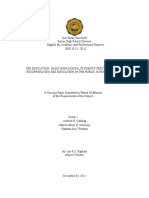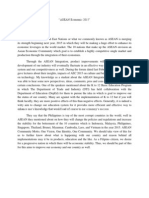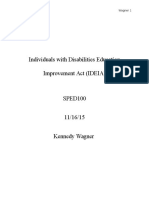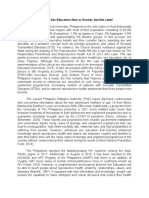0 ratings0% found this document useful (0 votes)
180 viewsPosition Paper
Position Paper
Uploaded by
RicaThis document discusses the issue of sex education in the Philippines. It notes that teenage pregnancy and sexually transmitted diseases are increasing problems in the country. To address these issues, the Reproductive Health Law was passed in 2012, which mandates comprehensive sexual education in schools. Supporters argue this can help reduce stigma around sex, prevent health risks, and regulate sexual behavior among youth. However, the Catholic Church opposes this, believing sex should only be discussed at home. The document ultimately supports comprehensive sexual education as a way to properly inform youth and address growing public health concerns.
Copyright:
© All Rights Reserved
Available Formats
Download as DOCX, PDF, TXT or read online from Scribd
Position Paper
Position Paper
Uploaded by
Rica0 ratings0% found this document useful (0 votes)
180 views4 pagesThis document discusses the issue of sex education in the Philippines. It notes that teenage pregnancy and sexually transmitted diseases are increasing problems in the country. To address these issues, the Reproductive Health Law was passed in 2012, which mandates comprehensive sexual education in schools. Supporters argue this can help reduce stigma around sex, prevent health risks, and regulate sexual behavior among youth. However, the Catholic Church opposes this, believing sex should only be discussed at home. The document ultimately supports comprehensive sexual education as a way to properly inform youth and address growing public health concerns.
Original Description:
Sex Education
Copyright
© © All Rights Reserved
Available Formats
DOCX, PDF, TXT or read online from Scribd
Share this document
Did you find this document useful?
Is this content inappropriate?
This document discusses the issue of sex education in the Philippines. It notes that teenage pregnancy and sexually transmitted diseases are increasing problems in the country. To address these issues, the Reproductive Health Law was passed in 2012, which mandates comprehensive sexual education in schools. Supporters argue this can help reduce stigma around sex, prevent health risks, and regulate sexual behavior among youth. However, the Catholic Church opposes this, believing sex should only be discussed at home. The document ultimately supports comprehensive sexual education as a way to properly inform youth and address growing public health concerns.
Copyright:
© All Rights Reserved
Available Formats
Download as DOCX, PDF, TXT or read online from Scribd
Download as docx, pdf, or txt
0 ratings0% found this document useful (0 votes)
180 views4 pagesPosition Paper
Position Paper
Uploaded by
RicaThis document discusses the issue of sex education in the Philippines. It notes that teenage pregnancy and sexually transmitted diseases are increasing problems in the country. To address these issues, the Reproductive Health Law was passed in 2012, which mandates comprehensive sexual education in schools. Supporters argue this can help reduce stigma around sex, prevent health risks, and regulate sexual behavior among youth. However, the Catholic Church opposes this, believing sex should only be discussed at home. The document ultimately supports comprehensive sexual education as a way to properly inform youth and address growing public health concerns.
Copyright:
© All Rights Reserved
Available Formats
Download as DOCX, PDF, TXT or read online from Scribd
Download as docx, pdf, or txt
You are on page 1of 4
FAR EASTERN UNIVERSITY
Position paper on:
Contemporary Issues in the Philippines
Title:
Sex Education in the Philippines: A Solution or A Sin
Subject:
College Academic Skills in English
Submitted by
Rica Jane B. Cuntapay
Section-170
Course:
Bachelor of Arts in Psychology
Submitted to
Mr. Wayne Winter J. Uyseco
Date Submitted:
November 27, 2019
SEX EDUCATION IN THE PHILIPPINES: A SOLUTION OR A SIN
The issue of teenage pregnancy is one of the rampant problems that the Philippines is
currently facing. A survey conducted by the National Demographic and Health Survey (NDHS)
and the Young Adult Fertility and Sexuality Study (YAFSS) showed that from eight percent in the
year 2003, there was a two percent escalation on the number of women getting pregnant at the age
of 15-19 in the year 2013. Moreover, based on the results of the survey, rural teenagers started
childbearing earlier than teenagers from the urban areas with ten percent and seven percent
respectively (Paupan, 2019). An article from the Department of Health (2018) stated that on the
year 2013, 1 out of 3 young adolescents reported that they are engaging in premarital sex. In
addition, data shows that NCR (41%) and Central Luzon (31%) regions have the highest report on
early sexual encounters.
The proliferating cases of sexually transmitted in the Philippines is alarming. An article
published by the Department of Health presented a statistical data from the UNAIDS global report
on HIV found out that the Philippines is one of the countries with rapid growth of HIV cases in
Pacific Asia with 4, 300 reported cases in 2010 to an estimated 10, 500 cases in 2016. In an
interview of the Philippine News Agency with Ms. Joy Morin, DOH Central Office National AIDS
and STI Prevention and Control Program Officer, stated that from 1984 until March of the present
year, approximately 65,463 cumulative cases have been recorded and sexual contact is the
principal mode of transmission. Ninety-four percent of Filipinos who were diagnosed with HIV
are male and the age range of the thirty-one percent of the male population are from 15 to 24 years
old. (Montemayor, 2019)
With regard to the aforementioned statistics, the government proposed the “Integrated
Population and Development Act” on year 1999 (Fonbuena, 2013) and after several years of public
criticisms and debates, the Republic Act No. 10354 or the Reproductive Health Law was finally
enacted by the Philippine Congress under the Aquino administration on the year 2012 (Cabral,
2013). The implication of the law includes the supply of contraceptive distribution for free,
demand public hospitals to offer reproductive health services and to order public schools to teach
sexual education (Fonbuena, 2013). The primary objective of the law is to control overpopulation,
increasing number of teenage pregnancies and rapid growth of cases of sexually transmitted
diseases (Montemayor, 2019). Comprehensive Sexual Education (CSE) is one of the major
features of the Reproductive Health Law. An article from the Philippine Star News stated that it
would cover seven core topics which are: human body and human development; personhood,
healthy relationships; sexuality and sexual behaviors; sexual and reproductive health; personal
safety; and gender, culture and human rights. The following lessons that are involved in CSE will
help in developing the child’s self-knowledge, self-protection and a sense of appreciation and
openness for other sexuality. The core topics will be integrated to subjects such as Music, Arts,
Physical Education and Health; Araling Panlipunan; Edukasyon sa Pagpapakatao; Science; and
Personal Development. (Mateo, 2018)
I support the implementation of Comprehensive Sexual Education because it has several
benefits. First is it can reduce the stigma on sex. The University of the Philippines Population
Institute (UPPI) conducted a study in 2015 entitled Young Adolescent Fertility Study (YAFS)
confirmed that adolescents would choose to discuss sex-related issues to their peers instead of
consulting their parents. Since sex is considered as a taboo in this country, it allows students to
learn comprehensive and appropriate information from competent trainees that will help them to
understand reproductive health. Comprehensive Sex Education teaches students to be responsible
on their decisions and actions because it raises awareness about the prevalent problems in teenage
pregnancy and sexually transmitted diseases. It will also prevent risks of poor health outcomes. A
research conducted by Abrigo and Paqueo explained that reproductive health bill and teaching sex
education will help the regulation of adolescents’ sexual initiation. The efficacy of sex education
is supported by the following studies and surveys by Johns Hopkins Bloomberg School of Public
Health, the Medical University of South Carolina, the Research Institute for Tropical Medicine,
the University of California, and the Philippine Statistics Authority.
The Philippines, the predominantly Catholic country in Asia is known for its conservatist
culture. The Catholic Church condemns the Comprehensive Sexual Education which is under the
Reproductive Health Law and believes that sex should be taught at home by their parents. In an
interview of BBC News (2010) with Monsignor Pedro Quitorio, a spokesman for the highly
influential Catholic Bishops Conference, he stated that they are worried that there would be a
difficulty on how the topics of CSE will be delivered to the children especially those who are in
the elementary level. To relieve the problems of the Catholic Church, the representative of the
Department of Education, Mrs. Valisno, compromised that abortion and contraception will not be
mentioned in classroom discussions. According to her, the main goal of the program is not to
promote sex act instead it will be more focused on educating the young people about personal
hygiene and interpersonal relationships.
Comprehensive Sex Education will address the deficiency from sex-related information
that can save the future of the adolescents in the Philippines. Misapprehending sex only leads to
more dangerous situations. Knowing a clear information about sex does not make one person a
sinner, instead it will broaden a person’s understanding towards life especially in dealing with
decisions that involves health risks.
Sources:
BBC News. (2010, August 4). Church vs State in Philippine Sex Education Row. Retrieved from
https://www.bbc.com/news/world-asia-pacific-10552591.
Cabral, E. (2013). Reproductive Health Law in the Philippines. Retrieved from https://asean-
endocrinejournal.org/index.php/JAFES/article/view/48/471.
Commission on Population (n.d.). Comprehensive Sexuality Education: A Must in School
Curriculum. Retrieved from http://rpo10.popcom.gov.ph/index.php/8-featured-articles/134-
comprehensive-sexuality-education-a-must-in-school-curriculum.
Department of Health. (2018, October 17). Adolescent Health and Development Program.
Retrieved from https://www.doh.gov.ph/Adolescent-Health-and-Development-Program.
Department of Health. (n.d.). Philippines Addressing Rising Trend in New HIV Infections.
Retrieved from https://www.doh.gov.ph/node/10649.
Fonbuena, C. (2013, January 2). RH law: The Long and Rough Road. Retrieved from
https://www.rappler.com/newsbreak/18730-rh-law-the-long-and-rough-road.
Mateo, J. (2018, August 8). DepEd: Comprehensive Sex Education to Develop Responsible Youth.
Retrieved from https://www.philstar.com/other-sections/education-and-
home/2018/08/09/1840820/deped-comprehensive-sex-education-develop-responsible-youth.
Montemayor, T. (2019, June 13). DOH Sounds Alarm Over Increasing HIV Prevalence Among
Young Men. Retrieved from https://www.pna.gov.ph/articles/1072292.
Montemayor, T. (2019, April 4). Integrating Sex Education in Schools to Empower Learners.
Retrieved from https://www.pna.gov.ph/articles/1066447.
Paunan, J. C. R. (2019, September 5). The Risks of Teenage Pregnancy. Retrieved from
https://pia.gov.ph/news/articles/1026925.
Philippine Institute for Developmental Studies. (n.d.). Opposition to Sex Education Unfounded-
PIDS study. Retrieved from https://www.pids.gov.ph/press-releases/299.
World Health Organization. (2018, February 23). Adolescent pregnancy. Retrieved from
https://www.who.int/news-room/fact-sheets/detail/adolescent-pregnancy.
You might also like
- Concept Paper Sex EducationDocument8 pagesConcept Paper Sex EducationYhazmin Iris Ilustrisimo100% (1)
- Informed Consent-Assent FormDocument3 pagesInformed Consent-Assent FormShahani Cel Mananay100% (1)
- An Incident ReportDocument5 pagesAn Incident Reportex_travaganza87No ratings yet
- ADocument3 pagesAAnonymous TN0Qe09lw100% (1)
- Bill of Rights Project ReflectionDocument1 pageBill of Rights Project ReflectionMiss ANo ratings yet
- Informed Consent FormDocument2 pagesInformed Consent FormRonald Sebastien Lagare100% (1)
- SEE ModuleProject-ArtAanlysis ARTAP10DDocument4 pagesSEE ModuleProject-ArtAanlysis ARTAP10DRyan WongNo ratings yet
- My Philosophy in LifeDocument1 pageMy Philosophy in LifeJonalyn MonteroNo ratings yet
- Day 1.2 Reflection PaperDocument3 pagesDay 1.2 Reflection PaperThea Mari MagdasocNo ratings yet
- Lucid Dreaming - Concept PaperDocument3 pagesLucid Dreaming - Concept PaperMell ann De LimaNo ratings yet
- Arguments: Pros ConsDocument6 pagesArguments: Pros ConsKatsurica KoikeNo ratings yet
- Essay About LeadershipDocument2 pagesEssay About LeadershipViranty FasaNo ratings yet
- Work Immersion Outputs 2Document7 pagesWork Immersion Outputs 2Mark ZalsosNo ratings yet
- Reflection On Child LaborDocument3 pagesReflection On Child LaborJemuel LuminariasNo ratings yet
- Position Paper On STSDocument6 pagesPosition Paper On STSMarynella SucalditoNo ratings yet
- LESSON 1 in PR 2Document22 pagesLESSON 1 in PR 2Sarah Vallar33% (3)
- School of Graduate Studies: Mindanao State University-Iligan Institute of TechnologyDocument4 pagesSchool of Graduate Studies: Mindanao State University-Iligan Institute of TechnologyJenelin EneroNo ratings yet
- My Reflection EssayDocument2 pagesMy Reflection EssayKemberly Semaña PentonNo ratings yet
- Reflective EssayDocument2 pagesReflective Essayapi-260426895100% (1)
- Perception of LGBTQ+ Community at Corazon C. Aquino High School (CCAHS) About SOGIE Bill A Research PaperDocument21 pagesPerception of LGBTQ+ Community at Corazon C. Aquino High School (CCAHS) About SOGIE Bill A Research PaperRollie MandapatNo ratings yet
- Mod 7 TEST OF HYPOTHESIS For BSADocument15 pagesMod 7 TEST OF HYPOTHESIS For BSABuboy FarmerNo ratings yet
- Advocacy SpeechDocument2 pagesAdvocacy SpeechJim Charles M. MoralesNo ratings yet
- Impromptu SpeechDocument3 pagesImpromptu SpeechSamantha LarracasNo ratings yet
- 1987constitution of The Republic of The Philippines: Prepared By: ALEX S. SANCHEZDocument58 pages1987constitution of The Republic of The Philippines: Prepared By: ALEX S. SANCHEZAlex SanchezNo ratings yet
- Polgov Reaction PaperDocument2 pagesPolgov Reaction PaperMhitz TamayoNo ratings yet
- Module 1 - Introduction To CTP & Blept OrientationDocument46 pagesModule 1 - Introduction To CTP & Blept OrientationDarlen May DalidaNo ratings yet
- Special Report:: Working in The New Normal'Document42 pagesSpecial Report:: Working in The New Normal'Yashveer Takoory100% (1)
- Feasibility Study BECEDDocument11 pagesFeasibility Study BECEDCarrie Sangcap100% (4)
- Ge Elective 2Document7 pagesGe Elective 2Freyja PaddamNo ratings yet
- Ramos AdministrationDocument4 pagesRamos AdministrationCielo Tanhueco MacaraegNo ratings yet
- Asean Reaction PaperDocument1 pageAsean Reaction PaperWalz Wyu Wally100% (3)
- Excuse LetterDocument1 pageExcuse LetterCamille LuceloNo ratings yet
- Letter For MyselfDocument1 pageLetter For MyselfClaire PiaNo ratings yet
- A Critique Paper: Polytechnic University of The Philippines College of Communication Bachelor in Broadcast CommunicationDocument4 pagesA Critique Paper: Polytechnic University of The Philippines College of Communication Bachelor in Broadcast Communicationapi-371127133% (3)
- Multicultural Event ProposalDocument4 pagesMulticultural Event Proposalapi-258512054No ratings yet
- Defense ScriptDocument10 pagesDefense ScriptMagana, Bjorn KianNo ratings yet
- The Role of Discipline in Education and Its Impact in The Process of LearningDocument3 pagesThe Role of Discipline in Education and Its Impact in The Process of LearningStiffspeare Tabamo67% (3)
- Individuals With Disabilities Education Improvement Act (IDEIA)Document7 pagesIndividuals With Disabilities Education Improvement Act (IDEIA)api-309354535No ratings yet
- Concept PaperDocument3 pagesConcept PaperJewela Nogas100% (2)
- Example of Research HypothesisDocument1 pageExample of Research HypothesisBrylle Aemiel Jacobe Carandang100% (1)
- The Important of Sex EducationDocument2 pagesThe Important of Sex EducationarinNo ratings yet
- Thesis AbstractDocument32 pagesThesis AbstractJayral Sidon PradesNo ratings yet
- Reflection Paper About Big EyesDocument4 pagesReflection Paper About Big EyesDeirdre DizonNo ratings yet
- Julius B. Seda BSIT-201 Ethics: AnswerDocument3 pagesJulius B. Seda BSIT-201 Ethics: AnswerJulius SedaNo ratings yet
- PH 104 Notes On Moral DeliberationDocument12 pagesPH 104 Notes On Moral Deliberationminchion0% (2)
- Sample Reaction PaperDocument3 pagesSample Reaction PaperMark AbolaNo ratings yet
- Good AfternoonDocument24 pagesGood Afternooncatherine temblorNo ratings yet
- Methods of Research LyceumDocument11 pagesMethods of Research LyceumJesseca Jean Aguilar Sepillo100% (1)
- Parental Involvement & Digital Age - DunnDocument20 pagesParental Involvement & Digital Age - DunnNatalie C DunnNo ratings yet
- The Hypothesis and Assumptions of The StudyDocument1 pageThe Hypothesis and Assumptions of The StudyRichlle CortesNo ratings yet
- ANNEX 2 DepEd Evaluation Rating Sheet For Story Books and Big BooksDocument3 pagesANNEX 2 DepEd Evaluation Rating Sheet For Story Books and Big BooksEva Joyce Presto100% (2)
- Pa 103 Philippine Administrative Thoughts and Institutions Syllabus Moraca Maria Michelle CDocument12 pagesPa 103 Philippine Administrative Thoughts and Institutions Syllabus Moraca Maria Michelle CLö Räine Añasco100% (1)
- RRLDocument2 pagesRRLKim Charlotte Balicat-Rojo ManzoriNo ratings yet
- Research PaperDocument12 pagesResearch Paperapi-456524439No ratings yet
- Ra 10931Document2 pagesRa 10931abcefg blink0% (1)
- RA 9163 National Service Training ProgramDocument5 pagesRA 9163 National Service Training ProgramLance JardiolinNo ratings yet
- A Study On Brand Preference FinalDocument52 pagesA Study On Brand Preference FinalpiraiNo ratings yet
- Concept PaperDocument3 pagesConcept PaperVincent Troa CarandangNo ratings yet
- Sample CaseDocument47 pagesSample CaseBảo PhạmNo ratings yet
- Enhanced Sex Education Now or Sooner, But Not Later!Document6 pagesEnhanced Sex Education Now or Sooner, But Not Later!Paul Anthony VigoNo ratings yet
- Art Immersion in Angono RizalDocument2 pagesArt Immersion in Angono RizalRicaNo ratings yet
- Employability Skills and Personal AttributesDocument1 pageEmployability Skills and Personal AttributesRicaNo ratings yet
- File 2-Email EtiquetteDocument2 pagesFile 2-Email EtiquetteRicaNo ratings yet
- Rizal 6.2Document2 pagesRizal 6.2RicaNo ratings yet
- Ikehata SetsuhoDocument1 pageIkehata SetsuhoRica33% (3)
- Social Cognitive Learning Theory by Alfred BanduraDocument10 pagesSocial Cognitive Learning Theory by Alfred BanduraRica100% (1)
- Art App PresentationDocument11 pagesArt App PresentationRicaNo ratings yet
- Math in The Modern World Project ProposalDocument8 pagesMath in The Modern World Project ProposalRicaNo ratings yet
- Cse CG Araling Panlipunan Grades 1-10Document30 pagesCse CG Araling Panlipunan Grades 1-10Yntine Seravillo100% (6)
- Eapp Sex EdDocument2 pagesEapp Sex EdJoy CabalteaNo ratings yet
- Comprehensive Sexuality Education Lesson PlanDocument3 pagesComprehensive Sexuality Education Lesson PlanJona Gwen Rodis100% (1)
- Grade 10Document16 pagesGrade 10Sonia NaickerNo ratings yet
- MODULE 1 Sexed Bodies and Gendered Cultures - FinalDocument32 pagesMODULE 1 Sexed Bodies and Gendered Cultures - FinalJanelle P. FonsecaNo ratings yet
- Comprehensive Sexuallity EducationDocument54 pagesComprehensive Sexuallity EducationCastridah NachibingaNo ratings yet
- PNAC - 2022-7AMTP7 - Strategy Summary MatrixDocument18 pagesPNAC - 2022-7AMTP7 - Strategy Summary Matrixithran khoNo ratings yet
- 4p07 Sex Education ModuleDocument37 pages4p07 Sex Education Moduleapi-534748698No ratings yet
- Position PaperDocument1 pagePosition PaperEmerald James ZabalaNo ratings yet
- CSEQuestions and AnswersDocument26 pagesCSEQuestions and Answerseaka957No ratings yet
- Johryl Resaerch ReportDocument14 pagesJohryl Resaerch ReportSANNY OMELANo ratings yet
- pr2 DinoDocument88 pagespr2 DinoNhicole ArañoNo ratings yet
- GAD Activity Proposal 2023 FINALDocument3 pagesGAD Activity Proposal 2023 FINALDELJIE ANGANANo ratings yet
- CSE Region 8 Presentation PDFDocument46 pagesCSE Region 8 Presentation PDFQuimverly Reyes CaicdoyNo ratings yet
- Comprehensive Sexuality Education: Education For A Healthy FutureDocument8 pagesComprehensive Sexuality Education: Education For A Healthy FutureCristina AguinaldoNo ratings yet
- Enhanced Lesson Exemplar in Health 5Document6 pagesEnhanced Lesson Exemplar in Health 5Dexter escartinNo ratings yet
- Department of Education Division of Zamboanga Del Norte Godod DistrictDocument4 pagesDepartment of Education Division of Zamboanga Del Norte Godod DistrictKimberly BorlingNo ratings yet
- Research Paper KarlDocument61 pagesResearch Paper KarlLuisa RadaNo ratings yet
- Research 1Document39 pagesResearch 1Mary Divine Grace DucentesNo ratings yet
- Understanding CseDocument58 pagesUnderstanding CseJupiter I. MabolocNo ratings yet
- Inset 2023 2024 Cse Catch Up Friday Lao Angan Es ClusterDocument10 pagesInset 2023 2024 Cse Catch Up Friday Lao Angan Es ClusterCathlyn MerinoNo ratings yet
- CUF - Health PowerpointDocument13 pagesCUF - Health PowerpointMJ Esquillo LaygoNo ratings yet
- Economics: For Rwanda SchoolsDocument475 pagesEconomics: For Rwanda SchoolsIrumva RogerNo ratings yet
- CSE Report Edited ST 2 Final Clean 201023Document77 pagesCSE Report Edited ST 2 Final Clean 201023MIŞU VELIŞCUNo ratings yet
- I. Abstract: A. Deped: Comprehensive Sex Education To Develop Responsible YouthDocument4 pagesI. Abstract: A. Deped: Comprehensive Sex Education To Develop Responsible YouthCathrina Therese P. CornitaNo ratings yet
- Research Essay Riley Henning 2Document12 pagesResearch Essay Riley Henning 2api-509444264No ratings yet
- Department of Education: Republic of The PhilippinesDocument9 pagesDepartment of Education: Republic of The PhilippinesCrisanta Ca�ete100% (1)
- 2022 Sex Ed State Law and Policy ChartDocument26 pages2022 Sex Ed State Law and Policy ChartAlex KillerNo ratings yet
- Overview-Of-Comprehensive-Sexuality-EducationDocument25 pagesOverview-Of-Comprehensive-Sexuality-EducationMayda Rivera100% (8)

































































































